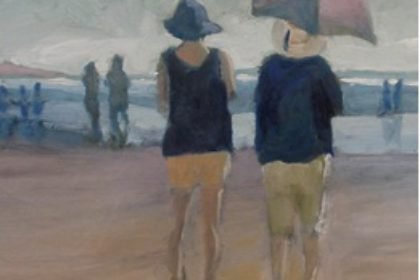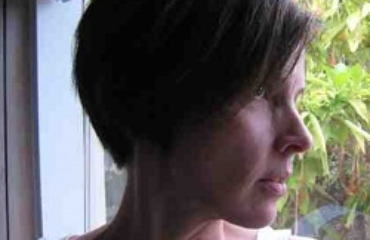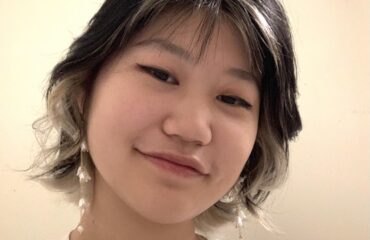STEPHANIE SAYS by Alain Douglas Park

A woman stands alone in the surf. She’s up to her mid-thighs in the water, warm Gulf of Mexico water, and she can feel the strong undertow of the sea. It pulls her legs and sucks the sand from under her feet. It’s tremendous—this undertow—a force of nature—powerful. But, she’s determined to stand in it. So, she does.
She’s not entirely alone. Her lover is near, standing behind her on the dry sand, holding a bag of beach supplies. She calls for him to come to her and though at first he doesn’t move, eventually, after she throws him a stare, he does. He might be a boyfriend—most would describe him as such—but that sounds too serious for the woman so she says lover, even though they’ve been in each other’s lives for years. It’s okay to say lover, since it’s been off and on. This is what she tells herself.
It’s not really swimming weather. Though warm, the wind is too strong. It whips the dry sand, sprays saltwater on her body, and plasters her short hair to the side of her head, molding it like a swim cap. The gulls sail around her without moving forward, hovering close to the ground, wings expanded in the constant breeze.
She walks deeper in, letting her fingertips trail on the water which is murky, browned with swirling sand.
They came from out West, or rather she did, from Los Angeles. He’s in New York now, an emerging actor, though if he hasn’t emerged by now, pushing into his mid-thirties, she knows he never will. She could have helped him at one point since she’s a little older than he and more experienced and it’s her business too—not acting, but getting actors to do what they do, getting, in fact, all those involved in the process to do what they do. And do it right. And on time and on budget. She produces. More than anyone else, she makes it happen.
They’d met up in Galveston (“in the middle,” she had said) because she wanted to look at the sea wall there first—a movie idea that’s been rolling around in her head ever since hurricane Katrina hit, then Rita, a period drama about the devastating one from 1900; a timely retelling to show people what real suffering looks like. And so she stood on the wall and took it in, felt its strength and the seas’ and she knew her idea was solid. She also knew she’d have to wait for another storm to hit (and hit hard) before she could pitch the idea for real. Though that would only be a matter of time.
Then they drove the full length of the Gulf Coast—her driving the entire way because that’s what she does—through the swamps of Louisiana, that endless elevated highway, and then lonely New Orleans, and onward to this panhandle town in the pit of Florida. She picked it precisely because it is on the panhandle and small and unassuming and would likely be deserted this time of year.
This is supposed to be a vacation, a getaway in between projects. It’s the off-season, the middle of October but still pleasant enough. And she likes him enough; he’s familiar (had been one of many at one time), which she’s fine with, since she doesn’t feel like trying all that hard right now. The town is deserted, like she thought it would be. There’re even fewer people than she expected. At first, she’d thought that maybe Katrina was still lingering here—or Rita or BP: Florida gets a little of all of it don’t they—but after the first hour, she could tell that the town has been like this for a long time. It’s kind of dumpy. They stay in a motel.
In the surf, wading against the undertow, she is already badly burned, cooked while sun tanning on the beach without any sunscreen. He, her lover, had forgotten the lotion at the motel and she made him go back to fetch it. He had forgotten her new two-piece as well, and, in the meantime, while waiting for the suit and lotion on the empty beach, she had taken off her clothes down to her bra and panties and sunbathed that way. The burn has put a floral print pattern on her breasts from her lace bra, two little arcs of flowers. That night, sitting on the bed in the motel room, she will think it’s kind of pretty, but it also hurts like shit and she will blame him for it and make him go from store to store, looking for the right kind of aloe.
She doesn’t respect him very much. She thinks he’s a pushover. She thinks he’s weak.
She says this a lot. People are weak. It’s her wisdom, what she’s learned, a phrase which she deploys like shooting rain over the people who work for her, over others whom she takes to bed, and over him.
So why is she with him? It’s not money, even though he has it; he’s had the semi-luck of a semi-talented man, but in the end she has much more of all three: money, luck, and talent. It’s not intellectual either. He’s not dumb per se, but she knows that she is much, much smarter than him. He’s creative; there’s that, but he is by no means brilliant. He is, on the other hand, very attractive and she loves men. He’s a good lover. More importantly, she knows that she can make him do things. Anything she wants. This is why she’s with him, has been for so long, off and on. This is what she tells herself.
Almost every single boyfriend she has ever had has brought up that one Velvet Underground song, Stephanie Says, the one with her namesake being compared to Alaska. And every one—which includes this near-successful, near-talented, malleable, yet good-looking man—gets her same flat stare, the same, really, wow, you know, you’re the first one to make that connection. I’m cold too? You must be a fucking genius.
She has no problem treating people this way. Because she has always been very honest and upfront about herself with others, and if someone still wants to be with her knowing full well how and what she is, well then, she immediately loses respect for them. They are like pets coming back to an abusive master. Morons. Idiots. They deserve whatever she doles out.
As she sits with him in the motel bed, late at night watching TV, flipping through the channels, she can feel her body radiating heat. Her burn is intense. She’s naked because of it, stripped down with no covers because everything that touches her scorches. She flips the channels quickly, the room darkened briefly between screens. Eventually she comes to one of her own shows, one that she has produced, and even though she’s not particularly proud of this one, it does make money like a garbage dump. She puts down the controller and proceeds to apply and reapply the aloe carefully, smoothing wide slicks of it on her arms and thighs, across her flowery chest. She has a glass of ice water by the bed which she drinks from occasionally, small, cool sips, and the cold water seems to instantly soak into her, gone forever once it passes her chapped lips. She looks at him lying next to her in the TV light, prone and relaxed in his grey striped boxers. She looks at him staring at the TV, just watching, comfortable and very much unburned as her show fades to commercial. She takes her glass from the nightstand and holds the cold water above his beautiful bare chest. She smirks at him. She says to him, “How tempting, what would you do, I mean, really, what could you do?” She likes to push this pushover.
Then, this lover, this man she has spent countless meals with, traveled with, lived with briefly on occasion, fucked in every manner possible, directed according to her will, bossed around, dominated, this man looks at her calmly and says right to her face that she should really stop confusing someone being weak with someone being nice. And his eyes don’t flicker a single millimeter when he says it. She is the one who looks away first.
This throws her. She withdraws her glass. She’s off kilter for the rest of the night. Sips her water slowly. Watches her terrible show in silence. Her body is burning and she can’t use it against him to right the balance of power, distract herself from his comment. It was different than anything he had said before. She sensed something different in his voice, a line drawn in the sand. But why now? Why here? What had changed in him? Or, was it even him at all?
She remains off kilter into the next day—awakens to it after sleeping in, her sunburn and her racing mind having kept her up most of the night. Her skin in the late morning air is dried and crinkled fire when she moves; even a cold shower seems impossible—although she does it anyway, and then stays in it for a long time. On the beach the day before she had decided that she wanted to eat at a pier she had seen in the distance. When she’s finally ready, finally through her routine, it’s mid-afternoon and they begin the long walk towards the pier. It is while walking with this man on the beach towards that pier that she starts to think of him and all their time together, all their years spent mutually or tangentially. Replaying all their past interactions as they walk. Moments, instances she thought she had controlled but which now, with every gritted step, become increasingly unclear to her.
The day before, wading in the surf, the undertow tremendous, she was so determined to stand in it. She’d called him over to join her from the shore where he was. But he hadn’t come. She’d called to him again and again, come here, come on, again, come here, and finally, eventually, he did come. And she’d thought at the time that somehow this meant she had won. Had won.
I want to eat here, okay—had won; no, not here, take me somewhere else, okay—won again; now get the check—won; and take me home—won; and take off your clothes and get your ass on the floor, I’m tying you up—won.
These previous thoughts now seem incredibly trivial to her. Presumptuous. He might have acquiesced for any number of reasons. On any number of occasions. As she slowly walks with him through the sand, dangling shoes in hand, she becomes more and more embarrassed by her past actions. She starts to see this man, with his pale eyes, his graceful tapered hands, as some form of saint for being with her. A good man. And she starts to see herself as some form of corrupting evil for being with him, for exposing the goodness that is him to the corroding influence that is her—the idea making her think that she might just be what she has never truly believed herself to be: A bad person.
There are crabs all over the beach. Little zigzagging darts of movement. She is startled and jumps at their incursions. She even moves to him for support, for some weird form of protection. A line of footprint divots converges in the surf behind them.
She starts to remember stories he’s told her, from his life, his childhood. Stories she thought at the time were tedious. She remembers him as a kid on another beach collecting burrowing crabs in his little hands. They tickled his palms as they tried to escape. She never offered a real reaction to this story or to any of the many he’s told. Not one meaningful comment. She thinks there must be pages of responses somewhere out there. Responses that she should have given.
She stops walking. He continues on alone without her for a pace or two, before turning to the sea. She looks at him standing there by himself, white shirt billowing, face aglow, squinting at the dipping sun. They’ve been walking a long time. She thinks, admits, that he looks very strong, squinting that way in the light, as if he is facing the struggles and limits of his career and his age and himself and is doing it graciously and with pride. She thinks of his face, the clean angles, the scratch of his unshaved cheek, the boy softness of his mouth. She thinks of how she never talks to him in the present, asks him how he is, or what else might be happening in his life. She opens her mouth to do so now but nothing comes. She wants to say so much but she has no idea how to organize the words.
She sees then how all of these acts of love, with him and every other person she’s been with, or moved away from, dumped on, every other person she’s used, conquered, bested, and left, how all these things have soaked her straight through, unnoticed. She feels flimsy and useless like a wet paper napkin. The inside of her chest aches, physically hurts, like nothing she’s ever felt before, and then, finally, after all this time, and beyond all reason, for some stupid fucking cosmic purpose, it cracks and she becomes human, compassionate, affected by her lover—she’ll say it: her boyfriend—of so many years, finally matched up in synch with him. Standing on the beach in a crystalline moment.
Now, this is the moment when you have to trust her, the her that is her, the producer, the leader, the bossy girl from the playground, the manipulator of men and women and audiences alike, that coaxer of heartstrings. So please, just do it. And pay attention. It’s very important:
Did she reach all these conclusions just like this, just like she says it happened, all on her own, standing on the beach with him in this beautiful moment? Did her feet rest in sand and her eyes on him when she had these life altering realizations?
You know her. Was it there? It’s a simple question. Was it there?
Well, if not there in that exact spot, in that exact way, then surely it was close to that, maybe after their meal on the way back to the car, before they started driving to the motel. She should be allowed a little poetic leeway. The parking lot sounds nice too, the sun just set, orange glow fading, walking hand in hand. She would take that. It could have been there. She could have done it. Made the leap.
But you do know her after all. So then, her doubting friends and lovers, please, if you would: Did she at least realize all these things before they got in the car, before they started driving back, before they crossed that intersection and were hit by the drunk running the red light? Did she at least realize it all before they flipped and landed upside down? Before they stopped spinning? Before all the scraping metal and splintered glass went silent? Please, if you could, because she’d really like to know what you think. She values your opinion on this, even if she might not want to hear it.
Nothing yet?
Well then, she would insist on going further. Another step into the water. Was it in the very least—this last, most important very least—before she looked at him hanging broken beside her, before she heard his wet breathing slow, before she saw his eyes, those beautiful pale eyes, so glossy, then still, only inches from her own? Well, what do you say? Did she realize it all before it was too late?
Or…
Was it after? Days after. Weeks after. Months after.
She will say it was before.
Just like she says it happened. Back on the beach.
It was before.
And for all those idiots who love her, either then or now, she would say to them that she now vows to never create another one of you for the rest of her life.
That the only reason she’s still even here, that she hasn’t walked into the ocean herself to join the undertow, is that while she did finally realize that she cared for this man—cares for him more now even after the fact; after he’s gone—he wasn’t the one she loved most.
For that she has to go way back, which she’ll do to survive, back to the only boyfriend who never brought up the Velvet Underground song. He was from Alaska. And she’s sure he still lives there. She’s sure at least he’s still used to the cold.
And who knows, maybe, if she ever stops moving, she’ll drop him a line, somewhere out there, at one point. It would have to be a very small line with no details. She does have her principles and when she makes a decision she sticks with it. Maybe just a postcard with nothing on it, or a photograph of some vista she might see and think he might like. She reserves the right to do this.
To all the others, lovers and friends, all those who have played with her, she wishes them well. Really, she does. She wishes them the best. Good luck. She hopes you succeed. She hopes you survive.
Issue 7 Contents NEXT: Two Americas, Two Poetics by Kate DeBolt


